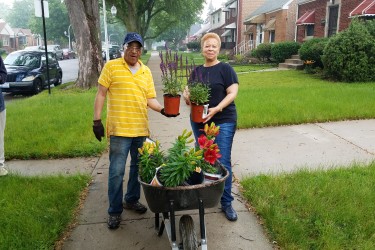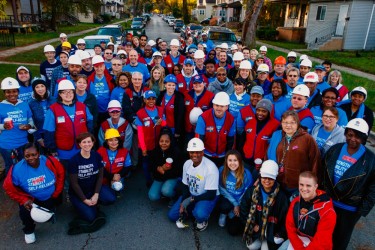A GREATER RETURN ON INVESTMENT
From new home construction to block beautification to resident action groups, these investments matter. They send a clear visual and psychological signal that there is value in the community, unlocking a neighborhood’s most powerful assets: its people. And when residents have something important at stake, the real change begins. There is an exponential effect of protecting and stewarding what they hold dear.
The Reality:
- One in five Chicagoans are severely rent-burdened, spending more than 50% of their income on housing, and are forced to make trade-offs.1
- Crime rates are higher in neighborhoods with a frequent turnover in residents.2
- School funding is tied to enrollment numbers, so high neighborhood vacancy rates create a domino effect of destabilizing community institutions.3
- Right now, someone in Chicago would need to work 80 hours a week at minimum wage to afford a market-rate, two-bedroom apartment ($1,895).4
- Poverty dominates for far too many, with 19.5% of the city's population living in poverty.5
- Over the last 10 years, the cost of housing and transportation in Chicago rose 2.03 times faster than local, household income.6
The Return:
While most of us may not take conscious stock of the effects of living in healthy or developed communities, there are many. They are the type that reverberate indefinitely, resulting in a multiplication of benefits whose value far outstrips the hard costs that initiate them.
- Employment Opportunities: Providing decent, affordable, and stable housing is a human capital investment, similar to education or job training, that could strengthen and steady the American workforce.7
- Academic Advancement: Children who remain in a consistent learning environment are more likely to graduate from high school and college.8
- Improved Health: Families who live in quality housing experience fewer health issues, dedicate twice as much of their income on their health, and take more preventative measures to stay well.8
- Additional Assets: People who own affordable homes have been found to have more discretionary income to buy health insurance, pay down debt, save for education or start a business.9
- Increased Safety: Lower crime rates occur when people move less often and are more present in their neighborhoods.10
When it comes down to it: Housing matters. Neighborhoods Matter.
Sources:
- http://blogs.luc.edu/chrc/2018/05/29/addressing-substandard-housing/
- https://link.springer.com/content/pdf/10.1007%2Fs10940-010-9093-7.pdf
- https://chalkbeat.org/posts/chicago/2019/08/13/more-administrators-more-money-for-small-schools-here-are-8-items-getting-more-funding-in-chicago-schools-budget/
- https://chicago.curbed.com/2019/6/18/18683776/chicago-illinois-affordable-housing-rent-burden
- https://www.census.gov/quickfacts/chicagocityillinois
- https://www.novoco.com/sites/default/files/atoms/files/nhc_losing_ground_101812.pdf
- https://scholar.harvard.edu/files/mdesmond/files/desmondgershenson.sp2016.pdf?m=1452638824
- https://www.nar.realtor/sites/default/files/documents/Homeownership-Stable-Housing2016.pdf
- https://housingmatters.urban.org/articles/improve-lives-and-expand-opportunities-recognize-power-housing
- https://www.huduser.gov/portal/periodicals/em/summer16/highlight2.html

